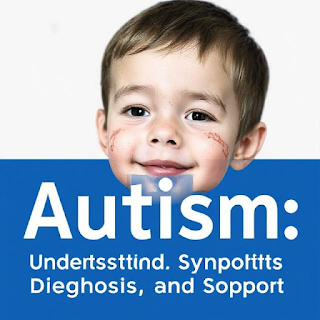- Get link
- X
- Other Apps
- Get link
- X
- Other Apps
Introduction
Autism Spectrum Disorder (ASD) is a neurodevelopmental condition that affects communication, behavior, and social interaction. While autism varies widely from person to person, early intervention and support can significantly improve quality of life.
In this blog post, we’ll explore:
✔ What is autism?
✔ Common signs and symptoms
✔ Causes and risk factors
✔ How autism is diagnosed
✔ Treatment and therapy options
✔ FAQs about autism
1. What is Autism?
Autism Spectrum Disorder (ASD) is a lifelong condition that affects how a person interacts with others, processes information, and responds to their environment. It is called a "spectrum" because individuals experience a wide range of symptoms and abilities—some may require significant support, while others live independently.
People with autism may have:
🔹 Differences in social interaction (e.g., difficulty making eye contact, understanding emotions)
🔹 Repetitive behaviors (e.g., hand-flapping, lining up objects, rigid routines)
🔹 Unique learning styles (e.g., strengths in memory, problem-solving, or creativity)
💡 Autism is not a disease—it is a different way of experiencing the world.
2. Common Signs and Symptoms of Autism
Autism can present differently in each individual, but some common early signs include:
In Infants and Toddlers:
✔ Limited eye contact or facial expressions
✔ Not responding to their name by 12 months
✔ Delayed speech or lack of gestures (pointing, waving)
✔ Unusual reactions to sensory stimuli (lights, sounds, textures)
In Children and Adults:
✔ Difficulty with social interactions and communication
✔ Repetitive movements or speech patterns (echolalia)
✔ Strong preference for routines and resistance to change
✔ Intense focus on specific interests (e.g., trains, numbers, animals)
✔ Sensory sensitivities (e.g., aversion to loud noises or bright lights)
⚠ If you notice these signs, speak with a doctor or specialist for evaluation.
3. Causes and Risk Factors of Autism
The exact cause of autism is not fully understood, but research suggests a combination of genetic and environmental factors contribute to its development.
🔹 Genetics: Some inherited genes may increase the likelihood of autism.
🔹 Prenatal Factors: Exposure to toxins, infections, or maternal health conditions during pregnancy.
🔹 Brain Development: Differences in brain structure and function.
📌 Vaccines do NOT cause autism—a myth that has been widely debunked by scientific research.
4. How is Autism Diagnosed?
Autism is usually diagnosed by developmental specialists, pediatricians, or psychologists through:
✔ Behavioral Assessments – Observing communication, social skills, and behavior.
✔ Developmental Screening – Conducted at 18 and 24 months as recommended by the CDC and WHO.
✔ Parent and Caregiver Reports – Input from family and teachers about daily challenges.
⏳ Early diagnosis leads to early intervention, which can improve outcomes for children with autism.
5. Treatment and Therapy Options
While there is no cure for autism, many therapies and interventions help improve communication, behavior, and daily living skills.
Common Therapies for Autism:
✔ Applied Behavior Analysis (ABA): Helps improve social and communication skills.
✔ Speech and Language Therapy: Supports speech delays and communication challenges.
✔ Occupational Therapy: Helps with sensory processing and motor skills.
✔ Social Skills Training: Encourages interaction and understanding of social cues.
✔ Special Education Programs: Tailored learning approaches for children with autism.
💡 The best treatment plan is individualized based on the child's or adult’s needs.
6. FAQs About Autism
❓ Is autism more common in boys or girls?
✔ Autism is more commonly diagnosed in boys, but it may be underdiagnosed in girls due to different symptom presentation.
❓ Can people with autism live independently?
✔ Some individuals need lifelong support, while others live independently, hold jobs, and maintain relationships.
❓ How can parents support a child with autism?
✔ Provide structure, use visual aids, practice patience, and seek professional support when needed.
❓ Are there any diets or supplements that help autism?
✔ While some parents report improvements with special diets (e.g., gluten-free, dairy-free), there is no definitive scientific evidence. Always consult a doctor before making dietary changes.
Search Description:
📌 Learn about autism symptoms, causes, diagnosis, and treatment options. Discover how early intervention and support can help individuals with Autism Spectrum Disorder.
Suggested Backlinks
🔗 Autism Speaks - Resources & Support
🔗 CDC - Autism Spectrum Disorder
🔗 National Autism Association
Suggested YouTube Video Links
📺 What is Autism? - Autism Speaks
📺 Signs of Autism in Toddlers
📺 How to Support a Child with Autism
Conclusion
Autism is a diverse condition that affects millions of individuals worldwide. While there is no one-size-fits-all approach, early intervention, therapy, and a supportive environment can help those with autism thrive.
📢 If you found this article helpful, share it to raise awareness and help others learn about autism!
Suggested Labels for Post:
#Autism #AutismAwareness #Neurodiversity #SpecialNeeds #ASD #AutismSpectrum #MentalHealth #EarlyIntervention
Would you like me to add anything else? 😊
ASD
Autism
Autism Awareness Neurodiversity
Autism Spectrum
Early Intervention
Mental Health
Special Needs
- Get link
- X
- Other Apps

Comments
Post a Comment